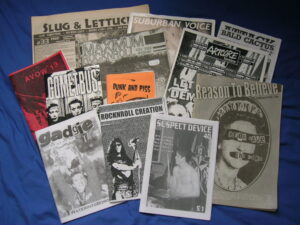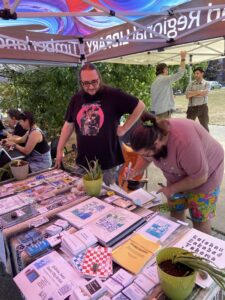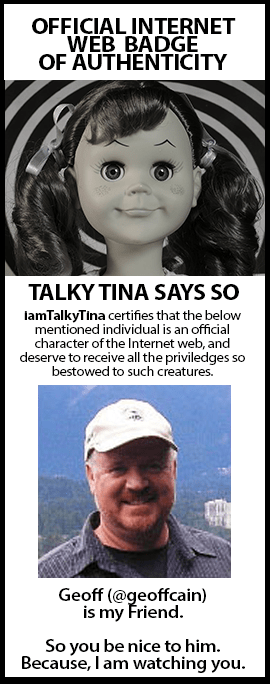I have recently, just for artistic inspirational reasons, went to San Francisco for the Labor Day weekend. My wife and I used to live there in the early 90s when we first graduated from college and got married. She worked her first “real” job at Pacific Gas and Transmission, and I was a substitute teacher, writer, and publisher of the humble zine “Notes from the Underworld.” It was a poetry zine but inspired by Dada, Surrealism, and the Fluxus movement.
Anyway, we go back now and again to hit some museums and galleries, see some friends, hang out in North Beach, and eat some really great food. This time, for no reason really, we decided to go to the SF Zine Fest. It was really an amazing experience. I expected it to be a handful of tables thinking that since the 90s, the space that self-published DIY expression was replaced by the internet and social media. I was so wrong: I was expecting maybe 50 vendors but there were at least 200 there. I hear that the LA and Chicago zine fests also have that many people. I love zines because of the artistic freedom they represent, the subversion of the publishing model, and just the raw human experience that goes into many zines.
At the Zine Fest, I ran into a couple of tables that represented work of students from a high school and a k-12. I thought that was fantastic. Art teachers working with English teachers to create joint projects. One of the things that I am concerned about as an instructional designer is student ownership of the learning. This fits right into our work on open pedagogy where students are not only demonstrating that they have met the outcomes of an assignment, but they are also learning to own the media with which they are creating. This spirit should be in our approach to the internet as well. There is so much to unpack here: it is a totally different relationship to learning, information, and media.
We grow up in this country as passive consumers of media and that informs our education. The corporate textbook often defines the course. Assignments that involve creating, like blogging, making videos or podcasts, posters, zines, etc. put the creation and the engagement with media back in the hands of the students. When the students are creating, they are asked to interrogate their own choices about what images they use, what text they use, how their message is presented, what they leave in, what they leave out, whose voices are centered in the narrative – these questions become skills. They will also start to critically question media that they didn’t create. It is a part of media literacy and the process of critical thinking.
The readings I have listed below are interesting to me because of the wide ranging examples and uses of zines: from students assignments to a teacher, Kate Ozment, turning her syllabus into a zine. This kind of work will be going into my instruction design work with open pedagogy and into my own teaching when I return to the classroom (English and ABE).
If there are some other readings that you think belong here or that myself and others would benefit from, drop me a message or leave a comment below. If you are already using zines in your classroom, I would love to gather more examples.
Readings, References, and Explorations
Bakaitus, Elvis. (2019) Zines as Open Pedagogy. Open Pedagogy Notebook.
Brown, A. , et al. (2021) Zines as Reflective Evaluation Within Interdisciplinary Learning Programmes. Frontiers in Education, v.6.
Fields, Erin, Alisauskas, A., and Taylor, J. (2020) Participatory Publishing: Zines as Open Pedagogy. UBC Library & Archives. University of British Columbia. Presentation.
Lonsdale, Chelsea (2015) “Engaging the “Othered”: Using Zines to Support Student Identities.” Language Arts Journal of Michigan: Vol. 30: Iss. 2, Article 4.
Orozoco, Cynthia Mari. (n.d.) Informed Open Pedagogy and Information Literacy Instruction in Student-Authored Open Projects. Open Pedagogy Approaches.
Ozment, Kate (2020) “Making the Syllabus Zine.” Sammelband. Women in Book History
Rallin, Aneil, and Ian Barnard. (2008) “The Politics of Persuasion versus the Construction of Alternative Communities: Zines in the Writing Classroom.” Reflections 7.3: 46-57.
Sahagian, Jacqui (2022) “Zine-making as Critical DH Pedagogy.” Scholar’s Lab. University of Virginia Library.
Scheper, J. (2023). Zine Pedagogies: Students as Critical Makers. Radical Teacher, 125.
Smith, Christopher. (2021) Zines: An Intro to Multidisciplinary Writing. Georgia Southern University. Book Chapter.
Stahura, Dawn. (2023) Teaching with Zines. SSU Library. Salem State University.
Teaching with Zines (n.d.) Barnard College.






